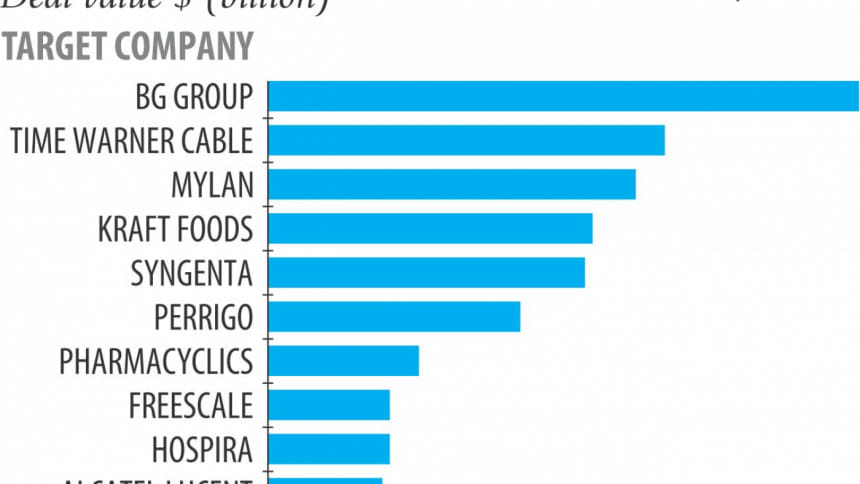Merger and acquisition hits all time high

According to Thomson Reuters, one of the reputed multinational mass media and information firms, the year 2015 was the biggest year ever in the history of corporate merger and acquisition (M&A). A record breaking $4.7 trillion M&A deals were signed last year. The previous best record was $4.4 trillion in 2007. Corporate world had witnessed some of the mega deals being signed throughout the year. Pharmaceutical giant Pfizer announced $160 billion merger with Allergan. According to Bloomberg, this is the largest ever deal in the history of healthcare industry and second biggest deal overall on record.
Chemical industry has also been going through the consolidation process. DuPont and Dow, two leading chemical companies, announced to unite as a $130 billion company. Beverage industry also had a massive deal when AB Inbev expressed its intention to acquire SABMiller, creating a $104 billion enterprise. There were 137 deals announced last year. Undoubtedly it is a huge number.
Albeit M&A has been a regular activity in the history of business, researchers so far have identified few notable periods when this had taken place at a breakneck pace. In the beginning of 20th century the trend was known as “horizontal mergers” meaning enterprises from the same industry used to unite and formed monopolies.
In 1960s, companies were trying to “diversify” by way of merger to create large conglomerates. One such great example was General Electric having multiple businesses like manufacturing of large equipment, television to even financial services. Because of globalisation and deregulation banking and telecom sector went through a period of considerable consolidation during 1990s.
Analysts have been trying to find out the root causes behind the huge M&A activities being taken place of late. Ernst & Young (EY), one of big four professional services firms, commented that, appetite for mergers and acquisitions is at the highest level since 2010 amid increasing confidence in an economic recovery. This comment came out of a study which surveyed 1,600 executives in 54 countries. Some of the interesting findings from the survey were: more than half of the companies plan to carry out acquisitions in the next 12 months; three-quarters of executives are planning more deals after a busy 2014; nearly one third are pursuing bigger deals, there is also an increasing interest in smaller bolt-on transactions.
Stable global economy with greater consistency boosted the confidence of the executives to be more optimistic. As a result, companies are going for bolder moves to generate future value. Along with the economic recovery, currency and commodity fluctuations are accelerating cross-border M&A. Few companies are eyeing up to shift their headquarters to low tax jurisdictions by merger and thereby reducing their corporate tax burdens. This move would allow them to increase their spending on R&D. One such example would be Pfizer Allergan merger. Once the deal is approved by the regulators, Pfizer PLC will move its headquarters to Dublin, Ireland and focus on corporate cost cuts. Corporations are looking to consolidate in order to be competitive. M&A has been one of the proven ways of reducing the cost of doing business and increased revenue from greater market share.
Few critical factors that intensified M&A last year were: healthy cash reserves of large corporations and the lowest ever interest rates. As results, companies had flexibility to make capital investments. It is often observed that, in case the normal growth of the business gets slowed down, enterprises are habitually motivated to grow by M&A rather than organically.
Although many deals were announced last year, we will have to wait and see how many of those cross the regulatory hurdles. It is too early to comment what these consolidation plans will bring about in the days to come.
Study suggests 70 to 90 percent of the time mergers fail to meet the long-term financial objectives set to deliver at the outset.
From a consumer right protection point of view, markets work best when there is a healthy competition among businesses. The way M&A is happening, question may arise -- is there a potential fear that in many industries the competition might not exist anymore?
The writer is the managing director of Syngenta Bangladesh Ltd.

 For all latest news, follow The Daily Star's Google News channel.
For all latest news, follow The Daily Star's Google News channel. 



Comments